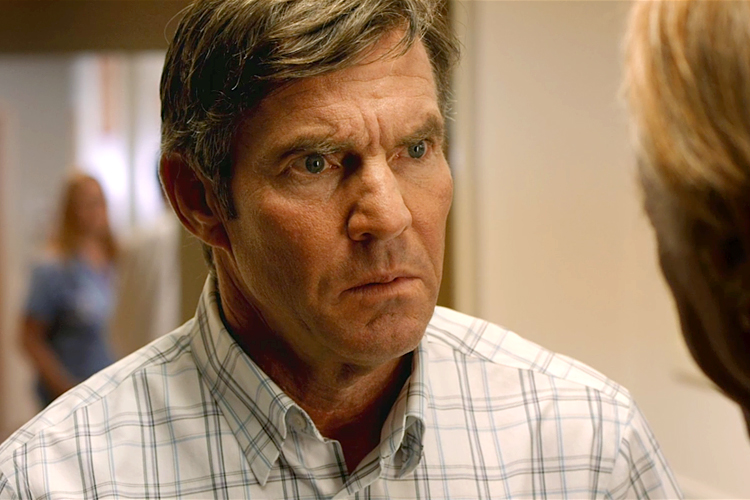
At Any Price is – at long last – a movie about today’s Farm Belt that farmers will recognize. American cinema has been romanticizing the small family farm for at least a quarter century since, to survive, US farmers have moved on to industrial scale agribusiness (with all its tradeoffs). The corporate farmer at the center of At Any Price is Henry Whipple (Dennis Quaid). Henry is a driven man, consumed by a need to have the biggest farm and to sell the most genetically modified corn seeds in southern Iowa. Henry is also stupendously selfish, utterly tone-deaf to the needs of anyone else.
Despite Henry’s dream to hand the business to one of his two sons, they despise him. The older son has avoided conflict by escaping to a vagabond life in international mountain climbing. The younger son, Dean (Zac Efron), plans his escape as a NASCAR driver and seems well on his path. Stuck on the farm for now, he can barely tolerate his father’s incessant grasping. But he’s small town royalty, he’s got a pretty girlfriend (Maika Monroe) and he’s as good-looking as Zac Efron, so life isn’t unbearable.
But Henry’s smug perch on top of the haystack is not as impregnable as it would seem. Along the way, he has cut some corners and stepped on other people, and it catches up to him. Henry’s empire threatens to topple, Dean clutches at his big career chance, and the two men – each and together – must react to developments that they never saw coming. Writer-director Ramin Bahrani spins a deeply authentic psychological drama as each man is forced into some uncomfortable self-examination.
It’s interesting that such a realistic exploration of New Agriculture in Middle America comes from Bahrani. Himself North Carolina-born, he has used nonprofessional actors to make three brilliant movies about struggling immigrants in America: Chop Shop, Man Push Cart and Goodbye, Solo. Goodbye, Solo was #5 on my list of Best Movies of 2009. Here’s a recent interview with Bahrani in the New York Times touching on At Any Price.
One of Bahrani’s insights is that the impacts of today’s capitalism aren’t necessarily from the malevolently rapacious (like Henry F. Potter in It’s a Wonderful Life), but from the indifference of the selfish. With almost every step that he takes, Henry Whipple screws other folks, but he’s convinced himself that he’s a prince of a guy.
At Any Price is a showcase for Quaid and Efron. Quaid’s portrayal of Henry is brilliantly textured, projecting a self-righteous bluster which barely masks the desperation threatening to erupt through his pores. And I’ve come to always look forward to seeing Efron, who, in Me and Orson Welles, The Paperboy and Liberal Arts, has proven that he is more than just the pretty boy of High School Musical.
Bahrani’s actors have taken full advantage of his screenplay. The character of Dean’s girlfriend is especially well-written. Beginning as a simple teen from a broken family looking for some fun, her journey takes several surprising turns. The actress Maika Monroe pulls it off with a memorable performance. In many ways, the story is anchored by Kim Dickens (Deadwood, Treme) as Henry’s wife and Zac’s mom, resolutely dragging her men out of their self-created sinkholes. Veteran character actor Clancy Brown (the guy has 209 acting credits on IMDb) is superb as Henry’s chief rival.
We are left with two men who finally must appreciate who they really are, whether we like them or whether they like themselves. After seeing At Any Price, I didn’t leave the theater thrilled, but that’s probably because a brilliant examination of two ambiguous men is more thought-provoking than stirring. And there’s nothing wrong with that.

1 thought on “At Any Price: psychological drama on the corporate farm”